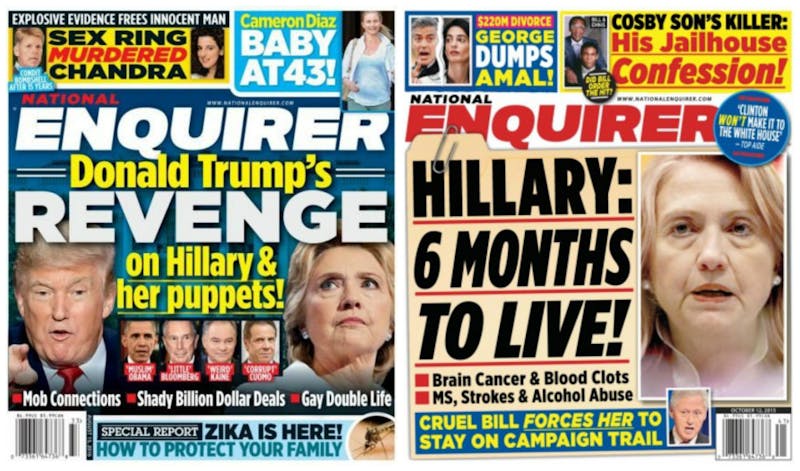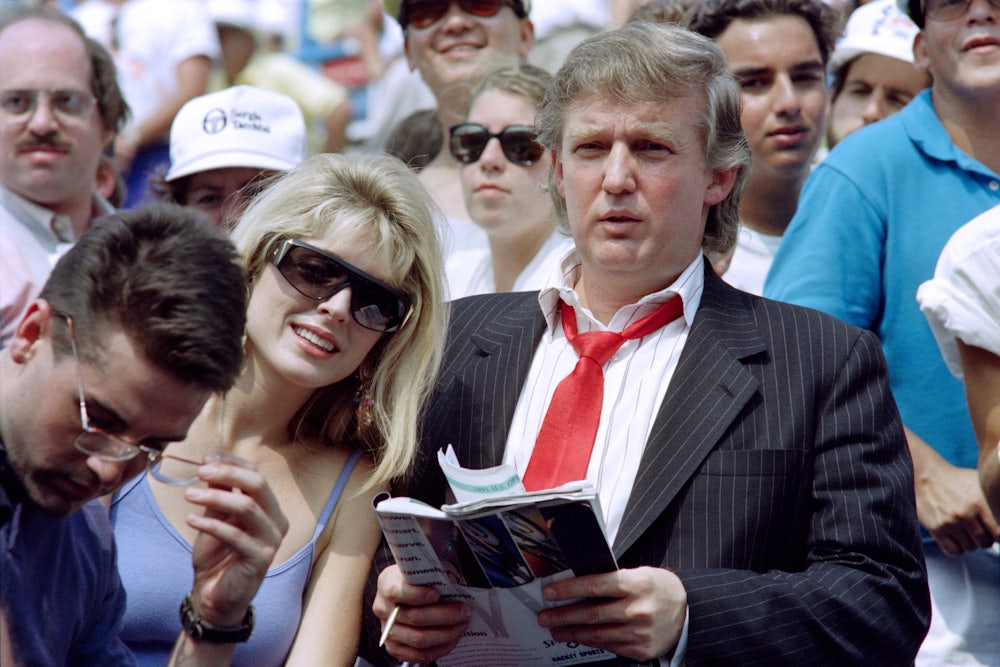Amid his feud with MSNBC’s Joe Scarborough and Mika Brzezinski last week, President Donald Trump inadvertently made a damaging confession. The Morning Joe co-hosts had alleged in a Washington Post op-ed on Friday that “top White House staff members warned that the National Enquirer was planning to publish a negative article about us unless we begged the president to have the story spiked.” Brzezinski, on that morning’s show, elaborated that the Enquirer harassed her close friends and teenage daughters about the damaging story, and that Scarborough was told by the White House that “this could go away.” Barely an hour later, Trump tweeted:
Watched low rated @Morning_Joe for first time in long time. FAKE NEWS. He called me to stop a National Enquirer article. I said no! Bad show
— Donald J. Trump (@realDonaldTrump) June 30, 2017
While Trump disputed Brzezinski and Scarborough’s version of events, he all but confirmed that he does have the power to spike an Enquirer story, if he so decides. This is a very strange thing for any president to claim, let alone a commander-in-chief who is on the warpath against “FAKE NEWS,” in which the Enquirer excels. But there are two obvious reasons why Trump is bashing CNN while elevating the Enquirer: He benefits when all news is considered equal, and facts become a matter of opinion. More practically, he can’t control CNN’s coverage in the way he can the Enquirer’s.
Trump is a tabloid president in more ways than one. His longstanding and intimate links to the scurrilous press is not just one of his quirks, but integral to his political identity. He first rose to national prominence in the 1980s by adroitly making himself a boldface name in the gossip columns. As New York Post editor Lou Colasuonno told Politico, the young Trump was “like a walking, talking tabloid editor’s dream. He was fun. He was entertaining. He sold papers for us—no question.” Larry Hackett of the New York Daily News agreed, calling Trump “this guy who walked out of tabloid heaven. He was rich. He was vulgar. He was a city guy … and the women—business, sex and a guy who loves the attention. You couldn’t beat it.’’
Trump’s relationship with gossip columnists was a two-way street. They loved Trump for providing great copy, but he used them to plant stories he thought were favorable to him. In 1991, Trump pretended to be a publicist named John Miller so he could present his side of his divorce from his first wife, Ivana, and also spread the false story that he was dating the model Carla Bruni. The actress Salma Hayek claims that Trump also planted a false story about her in the National Enquirer because she turned him down for a date. In a more political vein, Senator Ted Cruz has alleged that Trump is responsible for an Enquirer story linking Cruz’s father with the John F. Kennedy assassination.
Hayek and Cruz’s allegations are plausible because, as The New Yorker details in a recent profile, Trump has a strong friendship with David Pecker, the chief executive of American Media Inc., which owns the Enquirer. The Enquirer was one of the very few newspapers to endorse Trump in the last election, and even let him pen his columns. Beyond that, the Enquirer has given Trump favorable coverage while deriding his foes, ranging from Hillary Clinton (“HILLARY: CORRUPT! RACIST! CRIMINAL!” ran a headline before the election) to Megyn Kelly (an exposé of her plastic surgery and “criminal past”). As the New Yorker reports, the Enquirer serves another function for Trump: It buys up stories that are unfavorable to the president and squashes them. Last year, the Wall Street Journal reported that the Enquirer paid $150,000 for a story—which it never published—by former Playboy model Karen McDougal, who allegedly had a months-long affair with Trump while he was married to his current wife, Melania. The deal, which also included a writing gig, came with the condition that McDougal not criticize then-candidate Trump. “Once she’s part of the company, then on the outside she can’t be bashing Trump and American Media,” Pecker told the New Yorker.

Trump has exactly the same relationship with TMZ founder Harry Levin. As ThinkProgress reports, Levin “also made sure to spike stories that painted Trump or his family in a particularly negative light. One current staff member at TMZ reports that many negative stories about Trump ‘would be shut down’ without explanation.” While shielding Trump, TMZ has been nasty to his enemies. “Trump’s accusers ... got harsher treatment,” wrote Judd Legum. “TMZ highlighted how one woman, Jessica Drake, ‘might’ve pulled off the ultimate publicity stunt—announcing an online sex shop 1 day before accusing The Donald.’ The story wasn’t exactly true, Drake’s lawyer later made clear in an email to TMZ, but still served as an effective vehicle to discredit her as a sexual deviant and profiteer.”
The tabloid press is of obvious practical use to Trump, but there is a deeper ideological affinity. While much gossip is rooted in apolitical personal viciousness and voyeurism, there is also a tradition of subversive scuttlebutt used to undermine political legitimacy. The primordial example are the many covertly published books of eighteenth century France that included pornographic accounts of the private lives of the royal family, calumny that helped pave the way for the French Revolution.
In the American context, right-wing populism has often aligned itself with the tabloids, using gossip to wage war against Hollywood liberals, pointy-headed intellectuals, and the Washington establishment. William Randolph Hearst was a master of the form, which reached its apogee with popular “yellow press” columnists like Walter Winchell, Louisa Parsons, and Hedda Hopper. As historian Jennifer Frost noted in her 2011 book, Hedda Hopper’s Hollywood: Celebrity Gossip and American Conservatism, Hopper used her syndicated column, which ran from 1938 to 1966, “to build opposition to the New Deal in the 1930s, U.S. intervention in World War II, Communism at home and abroad during the Cold War, the Civil Rights Movement, and modern manners and morals.”
For Hopper, scandal-mongering was the perfect tool for right-wing populism because it allowed her to side with decent everyday Americans and against Hollywood pinkos and perverts, a stance that permitted her to titillate her audience even as she stirred up their political outrage. Hopper’s war against “Hollywood Reds” like Charlie Chaplin and Humphrey Bogart was a precursor of the Enquirer’s fusillades against Clinton.
There’s a further advantage for Trump in aligning himself with yellow journalism. The tabloids offer a sordid vision of society, where the mainstream image of celebrities elides their secretly miserable lives (whether because of addiction, aging, infidelity, or bankruptcy). In this nihilistic world, everyone is corrupt and every public statement is a lie. And if everyone is equally bad and untrustworthy, there’s no reason to hold Trump to any higher standard. This, ultimately, is why Trump and the tabloids were made for each other: They’re both committed to defining deviancy down.
